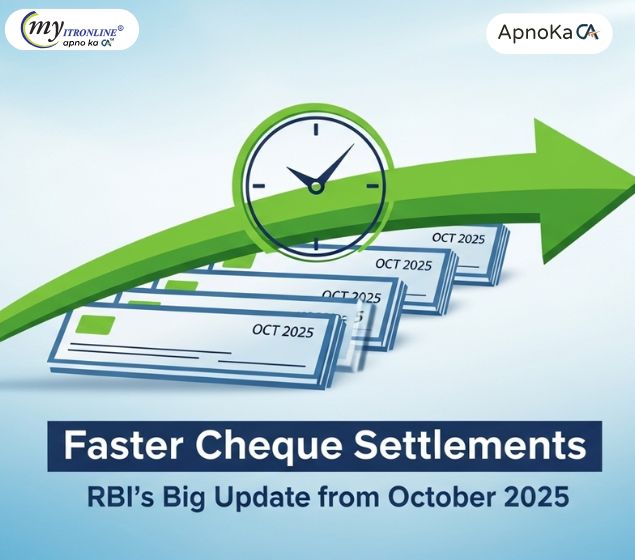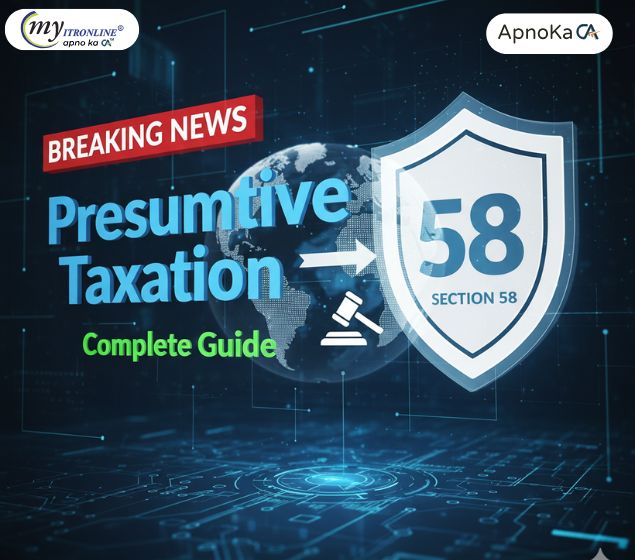# payments
12 posts in `payments` tag

Faster Cheque Settlements: RBI’s Big Update from October 2025
The Reserve Bank of India is launching a faster cheque clearing system from October 4, 2025. Cheques will now be processed continuously throughout the day, reducing settlement time from 1–2 days to just a few hours. This change benefits both individuals and businesses by improving cash flow and reducing fraud risks.

Breaking: Presumptive Taxation Moves to Section 58 - Complete Guide
The Income Tax Act 2025 introduces Section 58, replacing Section 44AD for presumptive taxation of small businesses. This provision applies to eligible assessees with turnover up to ₹2-3 crore, offering simplified tax computation at 6% for digital transactions and 8% for other receipts, or actual profit—whichever is higher. The change promotes digital payments and reduces compliance burden for small businesses while maintaining revenue collection efficiency.
.jpg)
100% Penalty Alert: Complying with Cash Transaction Limits (269SS, 269T, 269ST)
This blog post provides a comprehensive yet easy-to-understand guide to Sections 269SS, 269T, and 269ST of the Indian Income Tax Act. It explains the rules regarding accepting and repaying cash loans/deposits (above ₹20,000) and receiving cash amounts (above ₹2 lakh) for various transactions. The post emphasizes the severe penalties (100% of the amount) for non-compliance, clarifies exemptions, and details how these transactions are reported in Form 3CD during a tax audit. It concludes with practical takeaways for taxpayers to ensure compliance and avoid issues.
.jpg)
Firms & LLPs: Prepare for New Partner Payment TDS (Section 194T)
This blog post explains the new Section 194T of the Income Tax Act, which takes effect on April 1, 2025. It requires TDS on payments such as salary, remuneration, commission, bonus, and interest made by partnership firms and LLPs to their partners. The post outlines the 10% TDS rate (20% without a PAN), the ₹20,000 annual threshold, and the timing for deduction. It also clarifies which payments are exempt, including capital withdrawal, profit share, and expense reimbursement. Additionally, the post offers a checklist for firms and partners to ensure compliance and avoid penalties.

Tax Audit Made Easy: Your Simple Guide to Section 44AB (FY 2024-25)
This blog simplifies the concept of Tax Audit under Section 44AB of the Income-tax Act, 1961 for regular taxpayers. It explains why tax audits are essential, clearly outlines the turnover/receipt limits for businesses (₹1 Crore/₹10 Crore) and professionals (₹75 Lakhs) for FY 2024-25, and details special cases involving presumptive taxation. The article highlights the crucial role of a Chartered Accountant, the forms used (3CA, 3CB, 3CD), and the general deadline of September 30, 2025. Finally, it elaborates on the significant penalties for non-compliance and offers practical advice for taxpayers to ensure a smooth audit process.

Section 194C Explained: TDS on Contractor Payments & How to Report It in Your ITR
This blog post serves as a complete and detailed guide for businesses and individuals to understand Section 194C of the Income Tax Act, 1961. It explains TDS obligations on payments to contractors, outlines applicable rates and thresholds, and most importantly, teaches how to correctly report these deductions in your Income Tax Return (ITR). From verifying Form 26AS and AIS to avoiding mismatch notices, this article helps you ensure compliance, avoid scrutiny, and maintain a clean tax record.

Official Clarification: UPI Transactions Above 2,000 Remain GST-Free
The Indian government affirms there is no GST on UPI transactions exceeding 2,000. This post clarifies that the confusion arose from NPCI's March 2023 introduction of interchange fees (up to 1.1%) specifically for merchant payments over ₹2,000 made via PPI wallets; this fee is not GST and isn't paid by customers. Standard bank-to-bank UPI remains free due to the MDR waiver. The government actively supports UPI growth through incentive schemes.
.jpg)
Everything You Should Know About the New UPI Transaction Regulations Going Into Effect on February 15, 2025
With effect from February 15, 2025, NPCI has implemented new UPI transaction regulations that prioritize automated chargeback processing, fraud avoidance, and expedited settlements. Businesses and consumers would gain from these changes as they increase the efficiency and security of digital transactions.
.jpg)
2025 Compliance Calendar: Important Business and Tax Due Dates for On-Time Submissions
To guarantee a seamless tax season, the 2025 Compliance Calendar gives people and companies important dates for filing taxes, submitting GST returns, and paying TDS. Businesses may stay out of trouble and maintain smooth operations by complying on schedule.
.png)
Reduced TDS Rates: Beneficial to Both People and Businesses
In order to lessen the tax burden on different types of payments, the TDS rates under Sections 194-IB, 194-DA, 194-G, 194-H, 194-M, and 194-O have recently changed. The TDS rate for insurance commissions, life insurance payouts, lottery commissions, brokerage fees, and rent payments will be lowered from 5% to 2% as of October 1, 2024, and April 1, 2025. A 2% tax under Section 194M will also be applied to payments made by non-auditable businesses to contractors and professionals. In addition, Section 194-O will apply a reduced TDS rate of 0.75% to e-commerce transactions. These adjustments aim to increase tax compliance across a range of industries and enhance liquidity for professionals, small enterprises, and individuals.
.png)
Key insights into how new income tax regulations can impact shareholders
For shareholders, the proposed increase in the corporate tax rate from 21% to 28% might have significant ramifications. Reduced capital gains, dividends, and corporate earnings might put stockholders at risk of higher taxes and slower market expansion. Higher taxes, though, may also lessen income disparity and boost public coffers. This blog examines the possible advantages and disadvantages of the new income tax laws for shareholders and offers advice on adjusting to these adjustments.
.jpg)
GST on Payment Aggregators: Impact on India’s Digital Payment Ecosystem
The blog explores the recent proposal put up by the GST Council to charge payment aggregators 18% GST for enabling small-value digital transactions up to ₹2,000 that are done using credit and debit cards. It investigates how this action can affect different parties, such as customers, merchants, and payment aggregators. The article also addresses the possibility of a shift in payment preferences in favor of options like UPI, which is not currently subject to these tax ramifications. It also emphasizes the background of the 2016 service tax exemption on small-value digital transactions, which was implemented to encourage the use of digital payments in India.
